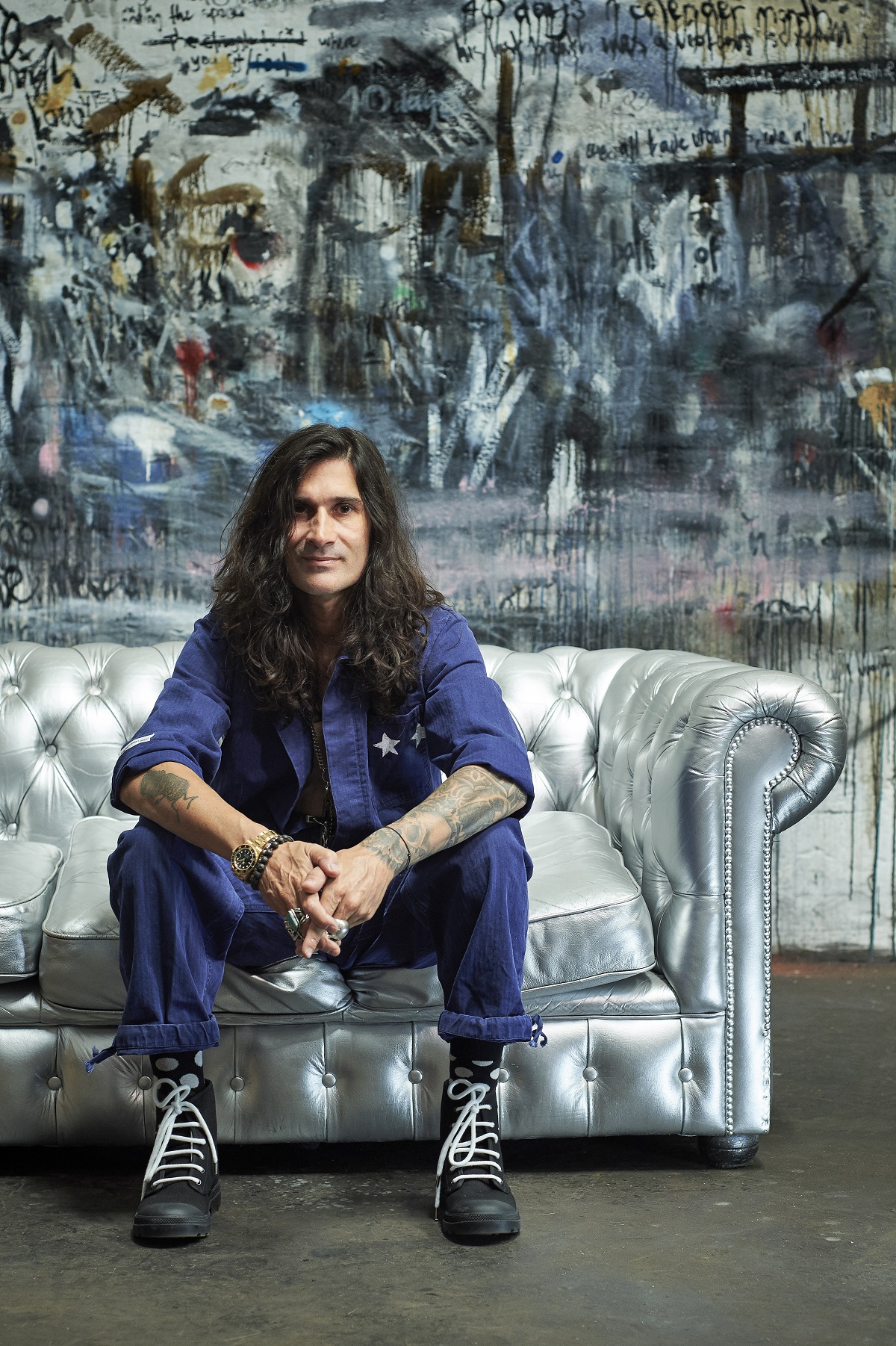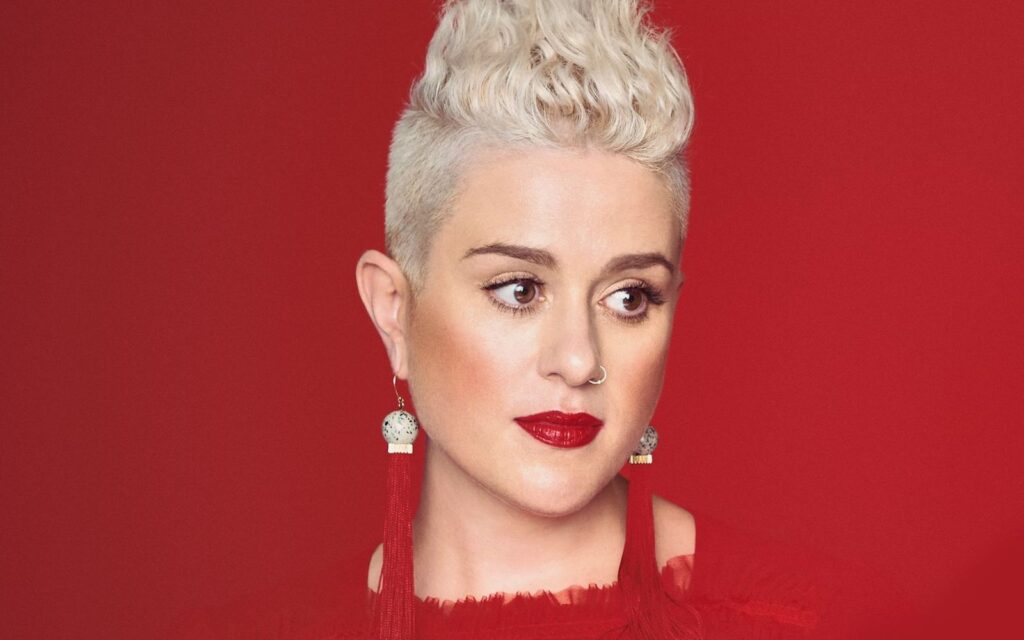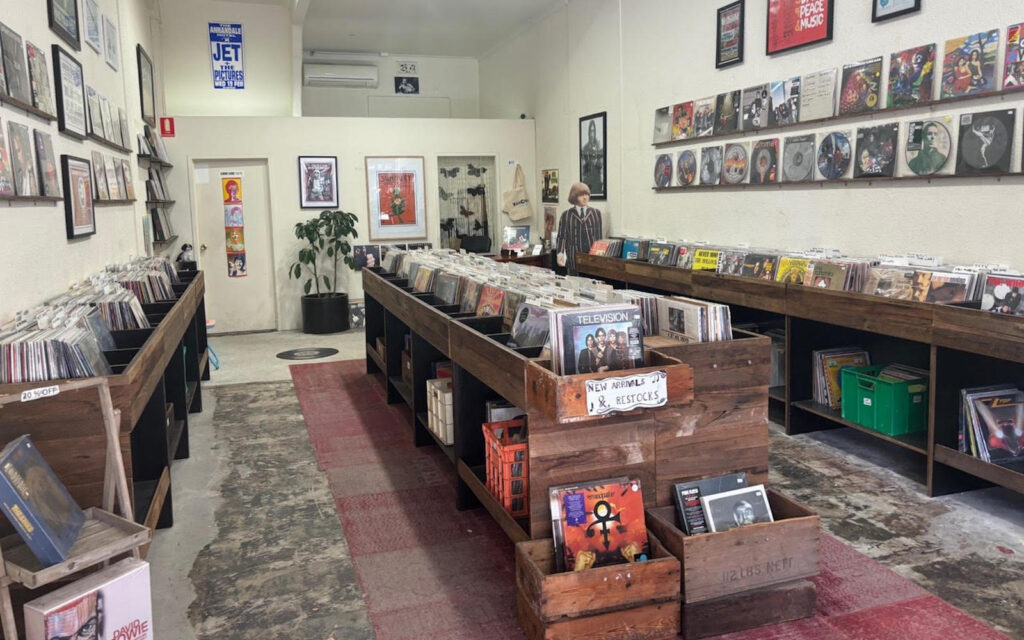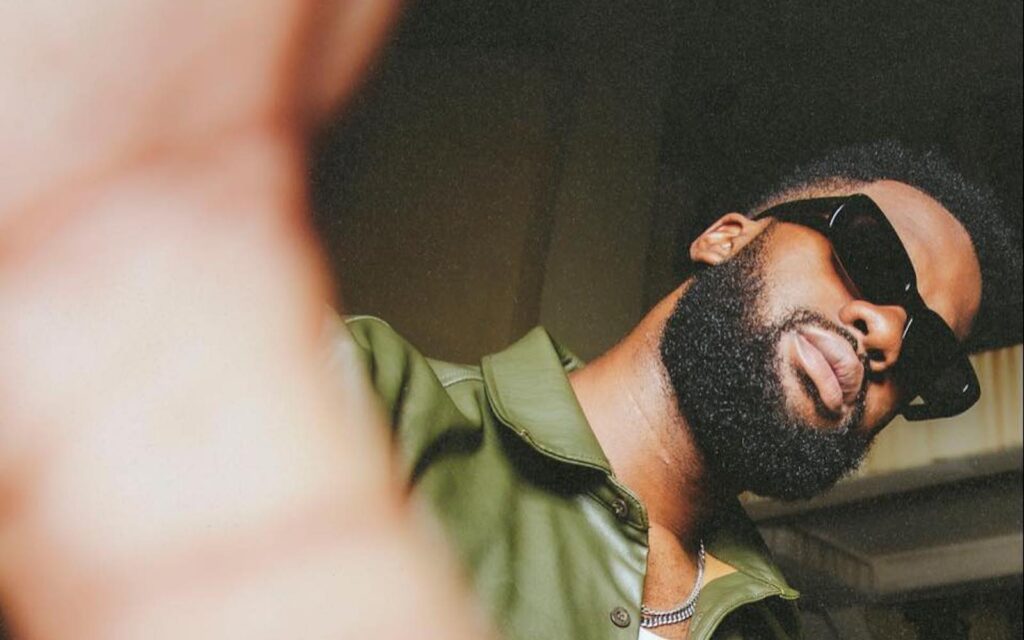Despite this, the Californian singer is relaxed, enthused, and, considering the tone of his music and associated imagery, surprisingly funny. During our conversation, he often emphasises certain points by exaggerating his delivery for comedic effect and is generally dry, quick-witted and candid.
Beat: I saw you at Sugar Mountain Festival last year, you were just solo then but you have others with you onstage this time?
MS: Yeah I have three bandmates now. We’ve got a drummer, and then I’ve got a guy that plays saxophone, guitar and keyboards, and another guy who plays guitar through a ton of different pedals.
That time I think you were triggering and manipulating your vocal live?
I’m always doing that, I’m not really triggering the music, to clarify, it’s live looping, so all the music is made live and then I loop it to build a track. But there is no pre-recorded music. And now I’m still doing a bit of that, but it’s a combination of building the beat with a loop pedal and having a band play on top of it, or for some songs that band initiates the music. It’s just having the band is good because I have a lot more freedom in the way I build the music and the way that I perform.
On your album you’ve managed to get a real feeling of isolation in the way it’s so layered and yet so bare. Was that an intentional approach?
Yeah, definitely. Lyrically I guess I’m exploring isolation, so I wanted the music to be really minimal and really spacious so that sonically it reflected lyrical content.
Could you tell me about the album title, Aromanticism?
Whaddaya wanna know?
Well I hadn’t really heard the term before but have looked it up and it’s obviously reflected in the lyrics and also, as we were just talking about, the sound that you were going for. But how would you describe it?
Well, you know, there’s the dictionary definition or really the non-dictionary definition, ‘cos it’s not in the dictionary, but the standard definition of it is the absence of romantic love or romantic attractions. And so my album kind of plays with that theme in a pretty broad sense. I guess the album is about the absence of romantic love, to varying degrees, or the stages of realisation that romantic love is not present in a particular dynamic.
Would you say it’s more of a personal reflection or a socio-political commentary?
It’s definitely the personal as political. I mean I don’t really find it possible to divorce the two, but it was inspired by my experiences, and you know, it’s my perspective. It’s not literal, but it is from my perspective.
Some of the songs like ‘Lonely World’ and ‘Plastic’ you released previously on your first EPs, was the idea for the album as a whole something you had planned for a long time?
Yeah I started writing the album in 2014, and over the course of time I’ve released other music, but I was always working on this kind of broader project. And so I didn’t really know what songs would be on what, but I’d done the first EP, Mid-City Island, you know those are just demos. That was in 2014, they were just demos I was working on in my bedroom and I always had the plan to re-record the songs on there, and I did record a few of them, but the only one that ended up making it to the album was ‘Plastic’. I guess I didn’t expect when I first made Mid-City Island for anyone to listen to that music or for anyone to discover it, and then especially ‘Plastic’ ended up going a long way.
Over the course of the next few years while I was working on the album I realised I had to put other stuff out, so I put out my second EP, Lamentations, in the fall of 2016. And at the time it was cuts from the album that I didn’t think would make it, I didn’t think would fit. And then after I released ‘Lonely World’ I kind of did a double take and went ‘Wait a minute, this is actually way too good to just be on an EP, I need to put it in front of more people’, because I worked just to damn hard on it.
But generally speaking I like to think of songs as never really finished. I think that any piece of art is constantly in progress, always has more to reveal. And so I really enjoy being able to revisit songs and create new and different versions of them.
As you do onstage when you’re coming up with these loops right?
Yeah definitely, I mean the live show as you have seen and will see – if you come – is radically different from the record. Every song has been rearranged and reimagined, because a song is the gift that keeps on giving.
Going back to that first EP, it’s interesting comparing it, as obviously the production quality is a demo, but your sound is remarkably intact.
Yeah that’s amazing. I can’t say all of that is intentional, it’s just me being me and by nature of my voice being present on all of my music, it creates a through line, a connecting thread, even if the production quality changes. But one of the things I was really conscious of on this record was the need to step it up in terms of production value and I didn’t want it to be as sparse as my older music, but it was important for it to be minimal and bare and raw enough that it didn’t feel like a radical departure from my early work.
Did it take you long to discover your sound?
It took me a very long time, it was very difficult because when I started out I didn’t know how to produce at all, and I didn’t know who I was going to work with, so it took a long time to figure that out.
Obviously your voice is your main instrument, but you play guitar, bass and a bit of synth on the record as well?
I play on ‘Don’t Bother Calling’ actually, the first full song on the album was my first time playing bass guitar. And then I do a lot of the synths on the record. I don’t really consider myself an instrumentalist, just because, maybe my own insecurities, it’s hard to imagine myself as someone who actually plays instruments. I like to think of my creative process as doing whatever I can with whatever tools are available. And because for most of my life I didn’t have instruments at my disposal, the only tool I had available was voice. And so, as well as considering myself a songwriter, I guess I consider myself a singer more than anything else, but it took me a really long time to even get to that point, because I didn’t start singing publicly until I was a bit older than the average.
So what’s the process then if you start writing purely with your voice – do you start by layering it, or do you come up with melodic ideas?
It’s so different for every song, but a song like ‘Lonely World’ started a cappella. I wrote the original demo just me, a microphone and a loop pedal, and so I just did that four on the floor beat by hitting a mic, and then sang the song and figured out all the music later. A song like that starts with looping and layering the voice, but in terms of the album, that’s the only song that was written that way, each one has a different process.
You seem to sculpt your vocal to push the idea of alienation in certain parts and juxtapose that with the real emotional in your delivery. Is that something you’re thinking about when you’re producing those songs?
I think I just want it to be as honest as possible. And I realised at one point that I do weird stuff with my voice sometimes just for fun, and the things that you do when you’re not really paying attention are often the most honest things that come out of you. So honesty was at the forefront of this record where I just wanted to be weird if I felt like being weird, and also be pedestrian if I felt like being pedestrian. That was the main reason that I guess there’s so much vocal manipulation stuff, it was just like, all my multiple personalities trying to escape.
It’s a very textural sound as well; do you think in terms of textures when you’re writing?
Yeah, I mean sound design was a huge thing. I’d been listening to lots of music that was kind of textural and, I don’t know, soundscape-y, and that’s a lot of the production work on the record, sound design.
Do you have any particular reference points that helped with your vocal, like choral music?
Yeah I really love the music of Eric Whitacre, are you familiar? He’s a modern choral composer and he makes a lot of really interesting music and messes with scale a lot. I don’t really know music theory, so it’s hard to describe what it is, but basically his harmonies rub up against each other and clash in really interesting and beautiful and scary ways. I also was really inspired by Moses Hogan, who was a vocal composer and also wrote a lot of spirituals. It was basically music that I sang in high school when I was in choir, kinda stayed with me. Brandy was an inspiration, I got really into listening to Brandy a cappellas from the ‘90s, and Destiny’s Child a cappellas from the ‘90s and early 2000s, those are really inspirational in terms of thinking of writing vocal arrangements.
I wouldn’t have guessed that.
I just got really inspired by r’n’b, and the way that they layer and vocal produce is pretty insane, but you often can’t tell until you’re listening without the instrumental, because it’s so intricate. I highly recommend it, like early Beyoncé stuff is crazy.
There’s something about your music that doesn’t make me think of American music that much because it’s kind of quirky and it’s got that melancholy to it that I would more associate with European or British songwriters specifically. Whereas someone like Beyoncé, you think of as being a bit more positive.
I mean it’s very pop forward, right? But I think for me it’s like listening to different types of music and extracting the aspects of it that I find most inspiring, or I can then change and fit to my own inspiration. Hopefully if I’ve done my job right, you wouldn’t be able to tell what’s inspired me, at least not everything ‘cos that means I’ve adapted it. But I often feel like my music would resonate better in Europe, I mean it kinda does already, than America, for sure.
Do you get labeled as an r’n’b artist though?
I get it all the time, I mean I had today, someone tweeted about that like ‘I really wanted to like this album but it’s just another r’n’b album, so not really my thing’. I mean, it happens really often, but that’s the number one thing that annoys me, that I complain about. And I complain about a lot of things. But that definitely takes the cake, I think people are listening with their eyes instead of their ears.
That would be very frustrating because it doesn’t sound like that at all to me.
Well I think if you know music and you’re really paying attention in a curious and open way you see that as an amalgamation of a lot of different styles.
What do you look for in a collaborator and what did you rely on from others for the album?
On the album I worked with a lot of different producers, as I was finding my voice production-wise and it was quite tough in the beginning, because I met super producers, or bigger people, who were interested in my voice but then just interested in applying it in ways that they saw fit, or implementing their vision. And so I learned over time to look for collaborators who give me the space to do what I want and need to do. Give me the space to fuck up, give me the space to grow, give me the space to experiment with them. So I got to get with Matthew Otto, who’s a Canadian musician who was in the band Magical Clouds, and that’s how I met him. And he produced ‘Doomed’ with me, and I just hung out with him for weeks and I just experimented and my friend Joshua Willing Halpen, who worked on most of the record, we would just get together and mess around for hours and hours and hours.
And then, with instrumentalists, like Thundercat, it would just be people who were free and don’t have an ego. Whenever I’ve worked with him he’s just like ‘I’ll just play’, and I’m like ‘Can you try this?’, he’s like ‘Yeah!’ It’s not a big deal, you know? So people who are humble, and free and respectful.
When working with other producers have you developed ways to ensure that your vision is respected?
Yeah – to be very specific. It’s important for me to be able to take the song from them and take it home and work on it by myself. Either after we’ve started it or I start it at home and then bring it in. But I need to have my time with it and I need to be able to touch it, and that’s something it took me years to learn. I mean, who knows how I will be in the future, but I realise for now that I will never fully feel like something is mine or something is stylistically reflective of me unless I can touch it myself and take it away and just really executive produce it, you know, and decide who else should work on it or if I should just fuck it up myself.
So do you have your own home setup where you can work on recordings?
I did, but I don’t live anywhere anymore, so I just do stuff on my laptop wherever I am.
So you’re just on the road a lot?
Yeah, I moved out of LA and I’m moving to London now, so I’m just figuring it out.
The European market right?
You’re the reason, you called it.
You also worked on the Solange album, which you’re probably sick of talking about but was an incredible album as well.
Mmhmm.
But she was an early champion of yours, how did she discover you?
I actually don’t know how she discovered me, she I think is just one of those people who has their ear to the ground, maybe someone passed her something. I actually have no idea.
And what was your experience like working with her?
It. was. a. lot. of. fun. I’ve learned to say as little as possible with this particular question.
Next question then. So when you’re in Australia playing these shows is most of the material from the album or can you take the mood where you want it to go?
Most of it’s from the album, it’s a short album, I don’t know if you’ve noticed. I do some older songs too, which is cool. I’m always surprised that people know stuff from the EPs, so sometimes I do like ‘Man on the Moon’, and then I do one new song that’s not on the record and then I do a Bjork cover now and then.
I would’ve guessed you’d be a Bjork fan.
It’s kind of funny, I wasn’t growing up, I didn’t know her music until I was halfway through making the album and someone was like ‘You remind me of Bjork’ and I was just like ‘I’ve never listened to her’ and they were like ‘What the fuck is wrong with you?’ So I only really know one Bjork album, well actually two, but it’s only really been like two years or so.
Is it more difficult to experiment onstage if you’ve got people playing with you?
Not if you have the right people and you are in sync, then you’re totally fine. It’s scarier because you don’t know what people are going to do, but in some ways doing it alone is scarier because all the responsibility is yours if you mess up or if you run out of ideas. At least this way I can lean on other people and it’s really nice. We’re playing a lot of festivals right now with the Laneways so it’s a bit harder, but I think everyone is encouraged to improvise at some point. I improvise still, and they all improvise a bit.
Besides moving to London after the tour what’s next?
And then I’m working on new music constantly, and then I go back to California to play Coachella and then a few more festivals. But working on new music is kind of the big thing.
Is there a specific project in mind?
I can’t say, you’ll just have to see. I don’t know what I can tell you, because then I’ll look stupid when I change it. It’ll be different from the old stuff, it will always be different.
By Alex Watts







